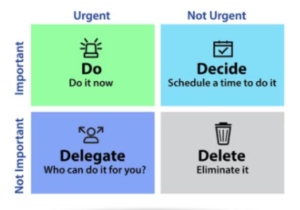A Comprehensive Guide to Mastering Time Management for Busy Entrepreneurs
Introduction:
Hello there! I’m excited to dive into the world of time management, specifically designed to help entrepreneurs like you conquer their daily challenges. In this article, we’re going to explore some practical strategies that will help you make the most out of your precious time, enabling you to achieve your goals, reduce stress, and improve your decision-making skills.
Why Taking Control of Your Time Matters:
Think about your time as a precious resource, much like a treasure you need to manage carefully. Being able to manage your time well has numerous benefits for busy entrepreneurs like you. When you use your time effectively, you’re not only able to get more tasks done but also experience less stress and make better choices. By improving your time management skills, you’re setting yourself up for both personal and business growth, creating a more balanced and fulfilling life.
Facing Common Time Management Challenges:
Let’s talk about some of the common obstacles that often get in the way of efficient time management for entrepreneurs. You might recognise these challenges:
- Feeling Overwhelmed by Tasks: Without a clear plan, it’s easy to feel swamped by all the things you need to do. For example, imagine a scenario where you have a packed schedule, and you find it hard to decide where to start.
- Balancing Multiple Responsibilities: Trying to handle various aspects of your business can leave you feeling scattered and unsure of where to begin. For instance, picture an entrepreneur juggling marketing, customer service, and financial planning all at once.
- Battling Procrastination: The habit of putting off important tasks can sneak up on you and slow down your progress. Consider a situation where you know a crucial report needs to be completed, but you keep postponing it.
- Deciding What’s Most Important: Figuring out which tasks deserve your attention can be quite a puzzle. Think about a time when you had a mix of urgent tasks and longer-term projects, making it hard to prioritise effectively.
Practical Solutions: Your Roadmap to Improved Time Management
Today I’m here to help you overcome these challenges and gain control over your time. Let’s break down these strategies into easy-to-understand approaches that anyone can adopt:
- Embracing Time-Blocking Strategies:
Imagine dividing your day into blocks of time, each dedicated to a specific task. This technique helps you stay focused and minimises distractions, making you more productive.
Picture starting your day with a clear plan in mind. With time blocking, you allocate specific time slots for different tasks, ensuring that you always know what you’re working on. For instance, you might dedicate 9:00 AM to 10:00 AM for answering emails and 2:00 PM to 3:30 PM for strategic planning. As you get accustomed to this routine, you’ll find a renewed sense of purpose and a greater sense of achievement.
- Embracing the Pomodoro Technique:
Have you heard of the Pomodoro Technique? It’s a simple method to boost your focus. Work for 25 minutes, then take a short break. This technique keeps you fresh and productive.
Imagine your workday transforming into a series of focused sprints. During each 25-minute session, distractions fade away, allowing you to fully immerse yourself in your work. For instance, you could set a timer for 25 minutes and concentrate solely on drafting that important proposal. When the timer goes off, take a brief breather before diving back in. This technique fights off fatigue and enhances your concentration, leading to more efficient work sessions.
- Simplifying Tasks with the Eisenhower Matrix:
Sort your tasks into four categories: Do First, Decide, Delegate, and Delete. This is the essence of the Eisenhower Matrix, a practical tool for prioritising tasks and making decisions.

Place your tasks in the appropriate quadrant:
- Do First: Tasks that are both important and urgent. These require immediate attention and action.
- Decide: Tasks that are important but not urgent. Set specific times to tackle these tasks later.
- Delegate: Tasks that are urgent but not important for you to personally handle. Delegate these tasks to others.
- Delete: Tasks that are neither important nor urgent. Eliminate or postpone these tasks to free up valuable time and focus on what truly matters.
The Eisenhower Matrix provides a clear framework for assessing tasks, ensuring that you channel your energy towards activities that align with your goals and responsibilities. For instance, you might place a client meeting in the “Do First” quadrant, schedule market research in the “Decide” quadrant, delegate administrative tasks, and disregard low-priority distractions.
Facing Potential Barriers and Overcoming Them:
I understand that implementing these strategies might come with challenges of its own. You might think, “I don’t have time to plan out my day” or “I can’t break away from multitasking.” But fear not! Let’s address these potential barriers and provide practical solutions to conquer them.
Barrier 1: “I don’t have time to plan out my day.”
Solution: Time is a valuable asset, and investing a few minutes in planning can yield remarkable returns. Think of planning as an essential part of your day, much like checking emails or attending meetings. Set aside just 10 minutes in the morning to outline your tasks for the day. This small investment of time will save you from the chaos of approaching tasks without a plan.
Barrier 2: “I can’t break away from multitasking.”
Solution: Multitasking might seem productive, but it often leads to fragmented attention and reduced efficiency. Begin by focusing on one task at a time. For instance, if you’re drafting a proposal, close any unrelated tabs or apps, and give it your undivided attention for 25 minutes using the Pomodoro Technique. Over time, you’ll notice that single-tasking not only enhances your work quality but also helps you complete tasks faster.
Long-Term Implementation and Continuous Refinement:
It’s not just about trying these strategies once and forgetting about them. Successful time management is an ongoing journey. As your business evolves and your responsibilities change, your approach to time management may need adjustments too. Remember, it’s all about finding what works best for you and fine-tuning your strategies along the way.
May you find empowerment, transformation, and abundant success in your journey toward mastering time management.
Need help with your to-do list? Check out my article on effective to-do list management for practical tips and solutions.




